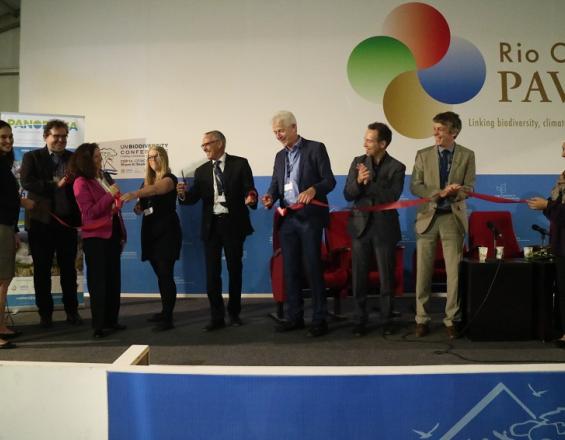Sharm el Sheikh, Egypt, 23 November 2018 (IUCN) – A new PANORAMA theme exploring how civil society can engage with business aims to scale up new partnerships and action to mainstream biodiversity across different sectors -- a key objective of the UN Biodiversity Conference taking place here this month.
IUCN launched a new thematic community on business engagement today at the conference as part of the PANORAMA - Solutions for a Healthy Planet initiative. This expansion of the PANORAMA initiative recognises the roles that civil society organisations can play directly in providing business with constructive input and technical guidance, and indirectly through influencing the legal and financial environments in which companies operate.
“Enabling civil society engagement to support and, in some cases, drive business to mainstream biodiversity in their operations is critical for achieving global biodiversity and sustainable development goals,” says Nadine McCormick, a programme officer with IUCN’s Business and Biodiversity Programme, “The business engagement case studies will foster greater peer-to-peer learning by featuring different approaches and tools that can be replicated and scaled up at the local, national and regional levels.”
The PANORAMA business engagement theme is part of IUCN’s BioBiz Exchange, a project backed by Agence Francaise de Developpement (AFD) that provides training and capacity building to CSOs on business engagement. The PANORAMA initiative documents the key success factors or approaches used for achieving the “solution” – which then can inspire others.
For example, one case study features a project between the global power company AES Levant and IUCN, which worked with local communities east of Amman that are affected by biodiversity degradation and rapid land use changes to develop a 10-year community environment plan. “In this instance, building a local governance system was vital for ensuring sustainability and scaling up our action,” says Samar Taha, a programme manager with the IUCN Regional Office of West Asia.
Other examples include:
- In Tanzania, an initiative by the African Wildlife Foundation has engaged one of the country’s biggest rice producers and farmers to increase agricultural productivity, while conserving forests, water sources and wildlife at a landscape level.
- In India, a partnership between DPCL-Dhamra Port Company Limited and IUCN has used scientific evidence and community outreach to ensure that the construction of a large deep sea industrial port will not harm a population of endangered sea turtles in India.
- In Canada, the establishment and protection of the Muskwa-Kechika Management Area has helped enable other activities, such as ecotourism, and minimised resource development in order to maintain the quality of the wilderness.
To learn more about the new PANORAMA business engagement theme, please join a webinar on 13 December, from 1100-1200 CET, by registering here or contact us at: biobiz@iucn.org
For more information about PANORAMA, visit the website: https://panorama.solutions/
